
Journal of Asia TEFL
Scope & Guideline
Advancing English Education Across Asia
Introduction
Aims and Scopes
- Innovative Pedagogical Approaches:
The journal focuses on innovative teaching methodologies, including task-based learning, blended learning, and the integration of technology in language instruction, aimed at improving the effectiveness of English language teaching. - Language Assessment and Evaluation:
Research on language assessment practices is a core area, exploring the implications of various assessment strategies on language proficiency and learner outcomes. - Teacher Development and Professional Growth:
The journal emphasizes studies related to teacher training, professional development, and the pedagogical practices of English teachers in diverse contexts across Asia. - Learner Engagement and Motivation:
It includes research focused on learner perceptions, motivation, and engagement strategies that enhance language learning experiences for students. - Technology in Language Learning:
The integration of digital tools and platforms in English language education is a significant focus, particularly in relation to remote and hybrid learning environments. - Cultural and Contextual Factors:
The journal also addresses the impact of cultural and contextual factors on language learning and teaching, recognizing the diversity of English language learners in Asia.
Trending and Emerging
- Technology-Enhanced Learning:
There is a significant increase in research focused on the use of technology in language education, including the use of mobile applications, online platforms, and virtual environments to facilitate language learning. - Mental Health and Well-Being in Language Learning:
Emerging studies explore the relationship between mental health, well-being, and language learning, addressing how emotional factors influence learner motivation and success. - Multilingualism and Translanguaging:
Research on multilingualism and translanguaging practices is gaining prominence, examining how learners draw on multiple languages in their language acquisition processes. - Critical Pedagogy and Social Justice:
There is a growing interest in critical pedagogy and its implications for fostering social justice in language education, encouraging learners to engage with cultural and societal issues through language. - Data Literacy and Assessment Practices:
An emerging focus on data literacy among educators is being observed, particularly in the context of assessment practices and the use of data to inform teaching strategies.
Declining or Waning
- Traditional Language Teaching Methods:
Research focusing on traditional, teacher-centered language teaching approaches has decreased, as there is a growing preference for more interactive and student-centered methodologies. - Static Curriculum Models:
Studies centered around inflexible and prescriptive curriculum models are less frequent, as educators increasingly seek adaptable and context-responsive curricula that cater to diverse learner needs. - Focus on Grammar-Translation Method:
The emphasis on the grammar-translation method in language teaching has waned, in favor of communicative and integrative approaches that prioritize real-life language use.
Similar Journals
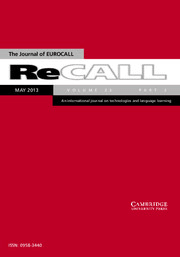
ReCALL
Elevating Discourse in Language Learning and TechnologyReCALL is a prestigious academic journal published by Cambridge University Press, focusing on the rapidly evolving interplay between technology and language learning. Established in 1989, this quarterly journal holds a distinguished Q1 ranking across multiple categories including Computer Science Applications, Education, and Linguistics and Language, reflecting its commitment to the highest standards of scholarly excellence. With an impressive Scopus ranking that places it in the top percentiles across its fields, ReCALL serves as a vital resource for researchers, educators, and professionals interested in the integration of technology in language education. It features cutting-edge research articles, innovative methodological approaches, and comprehensive reviews that offer insights into the current trends and future directions of language learning, teaching, and assessment. By providing a platform for penetrating inquiry and dialogue, ReCALL significantly enhances the discourse surrounding computer-assisted language learning (CALL) and its influence on educational practices worldwide.

Malaysian Journal of ELT Research
Fostering Quality Education through ELT Research ExcellenceMalaysian Journal of ELT Research is a pioneering platform dedicated to advancing the field of English Language Teaching (ELT) research, published by the Malaysian English Language Teaching Association. With an ISSN of 1511-8002, this journal serves as a vital resource for educators, researchers, and practitioners who are passionate about enhancing English language instruction in Malaysia and beyond. Although specific impact factors are currently not available, the journal's commitment to quality research is evident in its rigorous peer-review process, fostering innovative studies that address contemporary challenges in ELT. The journal embraces a wide range of topics within English language pedagogy, including but not limited to curriculum development, teaching methodologies, and language assessment. It provides an open-access model, ensuring that valuable research insights are readily accessible to a global audience. With its strategic focus on enriching English language education, the Malaysian Journal of ELT Research stands as an important contributor to scholarly discourse in the realm of language teaching and learning.
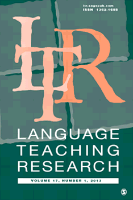
Language Teaching Research
Pioneering research for effective language teaching.Language Teaching Research, published by SAGE Publications Ltd, serves as a pivotal platform for scholars and practitioners in the domains of education and linguistics. Since its inception in 1997, this prestigious journal has maintained its status within the Q1 category for both Education and Linguistics, symbolizing its significant impact and commitment to excellence in research. With impressive Scopus rankings placing it among the top percentile in its fields, Language Teaching Research provides a comprehensive array of articles, studies, and reviews dedicated to advancing the theory and practice of language education. Although currently not an Open Access journal, it remains essential reading for those engaged in the evolving challenges and methodologies surrounding language teaching and learning. The journal aims to foster insightful discussions and disseminate innovative research findings, making it a crucial resource for educators, researchers, and students keen on enhancing language acquisition and pedagogical strategies.

Porta Linguarum
Unveiling the nuances of language through rigorous research.Porta Linguarum, published by UNIV GRANADA in Spain, is a pioneering journal dedicated to the fields of linguistics and language studies, with a dual focus on the educational implications and applications within these disciplines. Launched in 2008 and continuing its impactful contributions into 2024, the journal is recognized for its rigorous peer-reviewed articles that address contemporary language issues, pedagogical approaches, and linguistic research, evidenced by its notable rankings in the 2023 Scopus metrics. Porta Linguarum holds a distinguished Q1 classification in Linguistics and Language, alongside a respectable Q3 placement in Education, marking it as a valuable resource for academics and practitioners alike. With an impressive ranking of 231 out of 1088 in the Arts and Humanities category and a strong 78th percentile ranking for Language and Linguistics, this journal facilitates the exchange of innovative ideas and promotes scholarly discourse. Although currently not adopting an open access model, it remains an essential platform for advancing knowledge in linguistics and education.

Language Testing in Asia
Elevating standards in language assessment for the Asian landscape.Language Testing in Asia, published by SPRINGERNATURE, is a premier Open Access journal that has carved out a significant niche in the field of linguistics and language assessment. Established in 2011, this journal has rapidly ascended to the top quartile (Q1) in its category, showcasing its impact and relevance in the academic community, with impressive Scopus rankings that place it in the 92nd percentile of Arts and Humanities and 91st percentile in Social Sciences. With a commitment to disseminating high-quality research, the journal aims to provide a platform for innovative studies in language testing, evaluation, and assessment methodologies, particularly in the diverse context of Asia. Its open access policy since 2013 fosters widespread accessibility, ensuring that critical findings and insights reach a broader audience. By focusing on the intersections of language education, assessment practices, and cultural context, Language Testing in Asia is essential for researchers, educators, and policymakers dedicated to advancing the field of language testing.
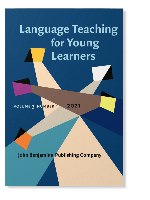
Language Teaching for Young Learners
Advancing research to nurture language skills in children.Language Teaching for Young Learners, published by John Benjamins Publishing Co, is a premier journal dedicated to enhancing the pedagogy of language acquisition in early childhood education. Since its inception in 2019, it has rapidly established itself within the research community, reflected by its high Scopus rankings—placing it in the 85th percentile for Language and Linguistics and the 84th percentile for Education. The journal aims to provide a platform for innovative research, practical insights, and theoretical discussions surrounding the teaching of languages to young learners, thus contributing significantly to the fields of Education and Linguistics. With an open access model currently unavailable, it caters to a diverse global audience, including researchers, educators, and policy-makers, keen on improving pedagogical practices. Located in the Netherlands, the journal's commitment to academic excellence is evident through its Q1 and Q2 rankings in Linguistics and Language and Education respectively, encouraging continual discourse in cultivating effective language education practices.
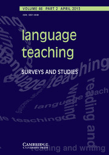
Language Teaching
Shaping the landscape of language education since 1969.Language Teaching, published by Cambridge University Press, is a premier peer-reviewed journal that has been at the forefront of the linguistics and language education field since its inception in 1969. With an impressive impact factor positioning it in the top tier (Q1) of its category, this journal is ranked 22nd among 1,088 in the Arts and Humanities field and maintains an outstanding 98th percentile ranking. Focusing on innovative research and methodologies in language teaching and learning, Language Teaching provides a vital platform for discussing the latest developments in pedagogy, applied linguistics, and curriculum design. Although it does not offer open access options, it reaches a broad audience of researchers, educators, and practitioners dedicated to enhancing language instruction across various contexts. The journal continues to evolve, with plans to cover emerging trends and challenges in language education until 2024, making it an essential resource for anyone invested in the teaching of languages.

FOREIGN LANGUAGE ANNALS
Elevating Standards in Language PedagogyForeign Language Annals is a prestigious academic journal published by Wiley, dedicated to advancing the field of linguistics and language studies. Since its inception in 1967, the journal has established itself as a vital resource for researchers, professionals, and students interested in the evolving dynamics of foreign language education and acquisition. With an impressive impact factor that places it in the Q1 category for Linguistics and Language in 2023, Foreign Language Annals ranks 48th out of 1167 journals in its domain, showcasing its influence and reach within the scientific community. Through a diverse range of scholarly articles and research findings, the journal aims to foster innovation and best practices in language instruction and pedagogy. Although not open access, it remains accessible to a broad readership, offering invaluable insights for those striving to improve language education and understanding across cultures.
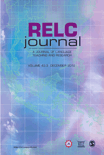
RELC Journal
Pioneering Research at the Intersection of Culture and PedagogyRELC Journal, published by SAGE Publications Ltd, stands as a leading platform in the fields of Education and Linguistics, boasting an impressive Q1 ranking in both categories according to the latest metrics. Established in 1970 and continuing its commitment to academic excellence through 2024, the journal features rigorous peer-reviewed research that explores the intersections of language, culture, and pedagogy. With a notable Scopus ranking that places it in the 98th percentile for both Language and Linguistics (Rank #16/1088) and Education (Rank #91/1543), the RELC Journal is essential for scholars, educators, and practitioners seeking to contribute to and stay abreast of cutting-edge developments in their respective fields. Although currently not open access, the journal remains accessible to a diverse audience and invites contributions that challenge conventional perspectives and inspire innovative practices in language education.
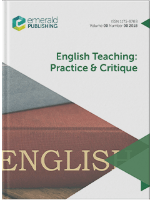
English Teaching-Practice and Critique
Empowering Educators with Critical Insights and Practical ReflectionsEnglish Teaching-Practice and Critique is an esteemed journal published by Emerald Group Publishing Ltd, focusing on the interdisciplinary fields of Education and Linguistics. With a commitment to advancing knowledge and practice in English language teaching, the journal offers a platform for innovative research, critical reflections, and practical insights that are vital for educators, researchers, and students alike. The journal has established itself in the academic community, achieving a Q3 ranking in Education and a prestigious Q1 ranking in Linguistics and Language as of 2023, highlighting its impact and relevance. Although not an open-access journal, its curated content remains accessible to a global audience, facilitating meaningful discourse and development in English language education. The journal spans articles from 2008 to 2014 and 2016 to 2024, making it a valuable resource for ongoing scholarly dialogue and pedagogical advancement. It is particularly recognized within Scopus rankings, standing at the 76th percentile in Arts and Humanities as well as the 74th percentile in Social Sciences, underscoring its significance and standing in these domains.